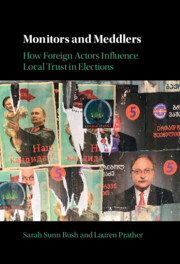23 results
Index
-
- Book:
- Monitors and Meddlers
- Published online:
- 28 July 2022
- Print publication:
- 11 August 2022, pp 304-312
-
- Chapter
- Export citation
6 - Intervener Identity
-
- Book:
- Monitors and Meddlers
- Published online:
- 28 July 2022
- Print publication:
- 11 August 2022, pp 177-210
-
- Chapter
- Export citation
Abbreviations
-
- Book:
- Monitors and Meddlers
- Published online:
- 28 July 2022
- Print publication:
- 11 August 2022, pp xiii-xiv
-
- Chapter
- Export citation
Acknowledgments
-
- Book:
- Monitors and Meddlers
- Published online:
- 28 July 2022
- Print publication:
- 11 August 2022, pp ix-xii
-
- Chapter
- Export citation
7 - Individual Vote Choice
-
- Book:
- Monitors and Meddlers
- Published online:
- 28 July 2022
- Print publication:
- 11 August 2022, pp 211-246
-
- Chapter
- Export citation
Tables
-
- Book:
- Monitors and Meddlers
- Published online:
- 28 July 2022
- Print publication:
- 11 August 2022, pp viii-viii
-
- Chapter
- Export citation
3 - Research Strategy
-
- Book:
- Monitors and Meddlers
- Published online:
- 28 July 2022
- Print publication:
- 11 August 2022, pp 70-96
-
- Chapter
- Export citation
Bibliography
-
- Book:
- Monitors and Meddlers
- Published online:
- 28 July 2022
- Print publication:
- 11 August 2022, pp 275-303
-
- Chapter
- Export citation
2 - How Foreign Actors Influence Election Credibility
-
- Book:
- Monitors and Meddlers
- Published online:
- 28 July 2022
- Print publication:
- 11 August 2022, pp 33-69
-
- Chapter
- Export citation
8 - Elections with Foreign Influences
-
- Book:
- Monitors and Meddlers
- Published online:
- 28 July 2022
- Print publication:
- 11 August 2022, pp 247-274
-
- Chapter
- Export citation
Contents
-
- Book:
- Monitors and Meddlers
- Published online:
- 28 July 2022
- Print publication:
- 11 August 2022, pp v-v
-
- Chapter
- Export citation
Figures
-
- Book:
- Monitors and Meddlers
- Published online:
- 28 July 2022
- Print publication:
- 11 August 2022, pp vi-vii
-
- Chapter
- Export citation
Frontmatter
-
- Book:
- Monitors and Meddlers
- Published online:
- 28 July 2022
- Print publication:
- 11 August 2022, pp i-iv
-
- Chapter
- Export citation
1 - Introduction
-
- Book:
- Monitors and Meddlers
- Published online:
- 28 July 2022
- Print publication:
- 11 August 2022, pp 1-32
-
- Chapter
- Export citation
5 - Meddlers’ Effects
-
- Book:
- Monitors and Meddlers
- Published online:
- 28 July 2022
- Print publication:
- 11 August 2022, pp 136-176
-
- Chapter
- Export citation
4 - Monitors’ Effects
-
- Book:
- Monitors and Meddlers
- Published online:
- 28 July 2022
- Print publication:
- 11 August 2022, pp 97-135
-
- Chapter
- Export citation

Monitors and Meddlers
- How Foreign Actors Influence Local Trust in Elections
-
- Published online:
- 28 July 2022
- Print publication:
- 11 August 2022
Refugees to the Rescue? Motivating Pro-Refugee Public Engagement During the COVID-19 Pandemic
-
- Journal:
- Journal of Experimental Political Science / Volume 9 / Issue 3 / Winter 2022
- Published online by Cambridge University Press:
- 13 April 2021, pp. 281-295
-
- Article
-
- You have access
- Open access
- HTML
- Export citation
Family Matters: How Immigrant Histories Can Promote Inclusion
-
- Journal:
- American Political Science Review / Volume 115 / Issue 2 / May 2021
- Published online by Cambridge University Press:
- 21 December 2020, pp. 686-693
- Print publication:
- May 2021
-
- Article
-
- You have access
- Open access
- HTML
- Export citation
Islam, gender segregation, and political engagement: evidence from an experiment in Tunisia
-
- Journal:
- Political Science Research and Methods / Volume 9 / Issue 4 / October 2021
- Published online by Cambridge University Press:
- 19 October 2020, pp. 728-744
-
- Article
- Export citation



